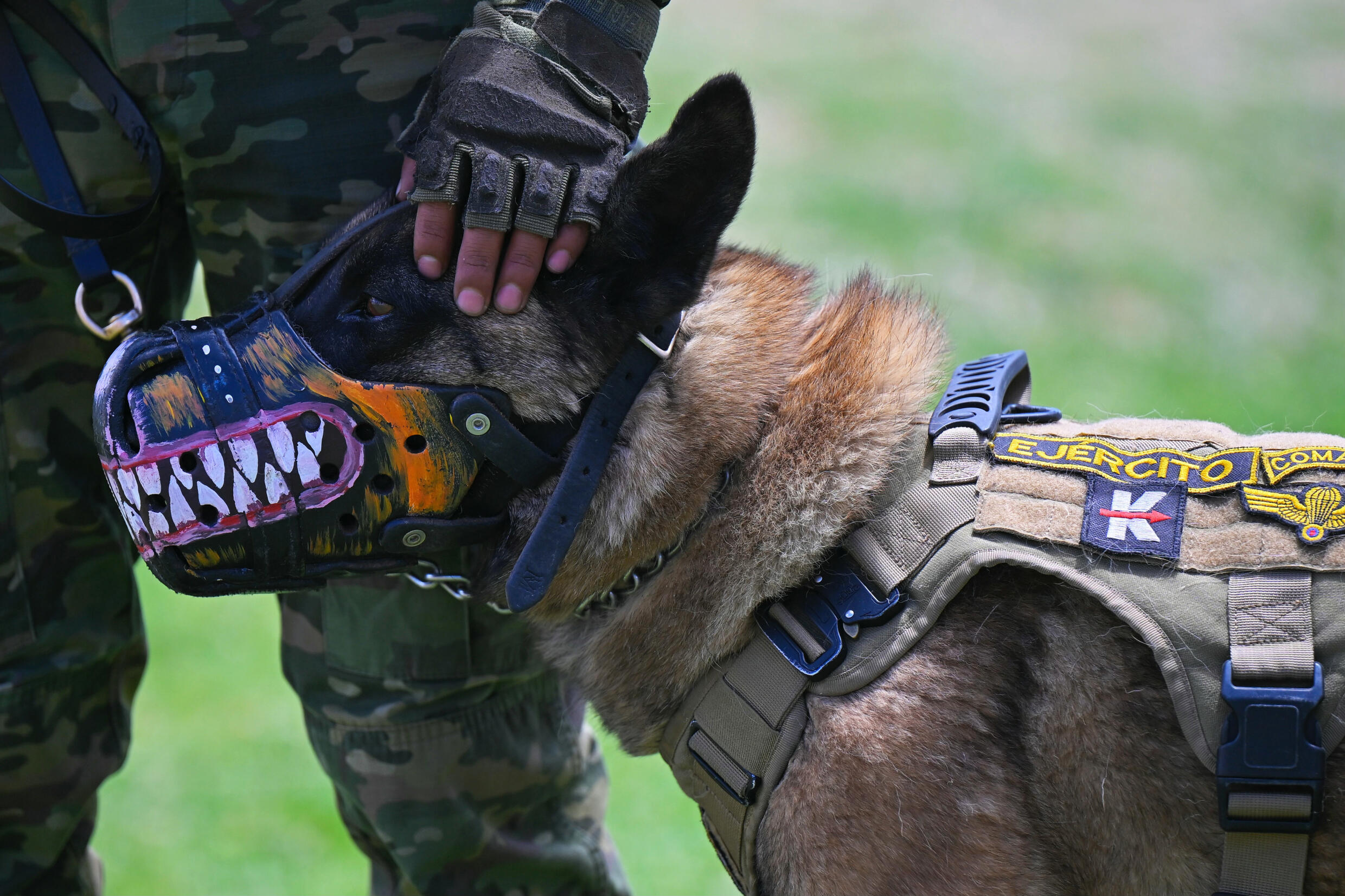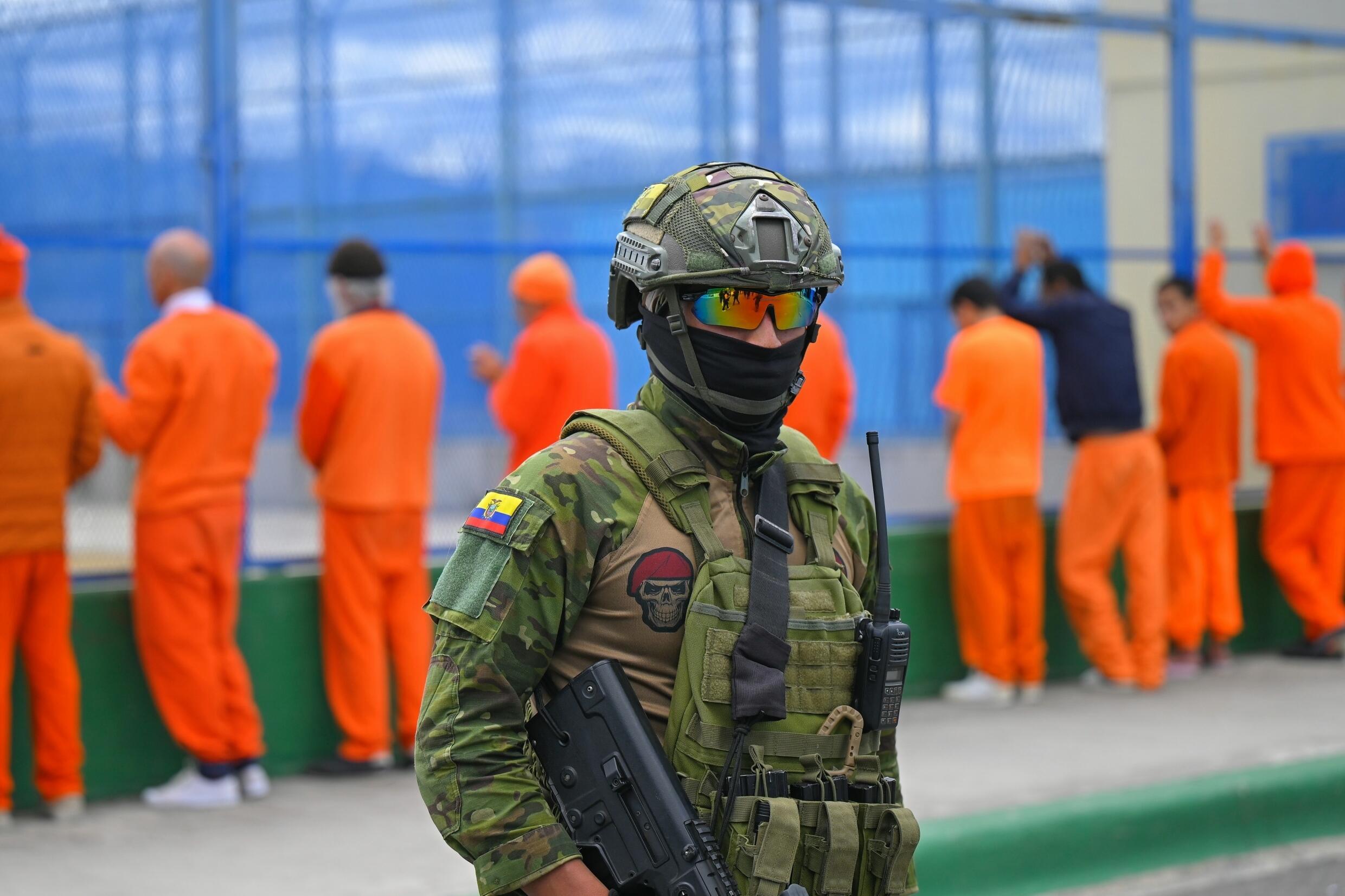Issued on: 23/02/2024 – 21:05Modified: 23/02/2024 – 21:04
3 min
The windows and walls of the Latacunga prison south of Quito are still pockmarked with bullet holes, the vestiges of a gang war waged between inmates who, using fear and corruption, have long wielded outsized control behind bars.
President Daniel Noboa declared war on gangs in January and launched a military crackdown on the country’s prisons, which had become the nerve center and battleground of narcos linked to Mexican and Colombian cartels.
Latacunga is now “100 percent under the control of the armed forces,” a soldier told AFP during a press visit to the prison. Like all the troops interviewed, the soldier did not want to be named.
However, despite the show of discipline and apparently cowed prisoners, three inmates slipped through the cracks and escaped Thursday — the same day that journalists toured the facility, the army said in a statement.
On an indoor football court, hundreds of inmates line up for an hour of physical exercise © Rodrigo Buendia / AFP
The incident highlighted the challenges faced by some 1,500 soldiers now in charge of the prison where cells had been turned into luxury rooms for crime bosses — one of them with a jacuzzi that has since been removed.
Elsewhere in the jail, the image of a half-naked woman adorns the walls of a nightclub, with a sofa and a plush red carpet. Here, security forces found drugs and weapons stashed in the walls.
State of emergency
Once considered a bastion of peace in Latin America, Ecuador has been plunged into crisis by the rapid spread of transnational cartels that use its ports to ship drugs to the United States and Europe.
Homicides increased almost eightfold between 2018 and 2023 when 46 in every 100,000 people were killed.
More than 460 inmates have been killed in brutal gang wars since 2021, including in Latacunga where multiple prison mutinies have broken out.
Noboa imposed a state of emergency in January after the prison escape of a notorious gang boss, and cartels reacted by taking hostage dozens of police and prison officials, later released.
They also threatened to execute civilians, set off explosives, burned cars and, on January 9, stormed a television station and fired shots in an attack that was broadcast live.
The army then sent in tanks and troops to regain control of Ecuador’s 36 prisons, which house 31,300 inmates, according to the most recent census.

Some human rights organizations have expressed concerns about the militarization of Ecuador’s prisons © Rodrigo Buendia / AFP
In Latacunga, home to 4,300 prisoners, authorities found a half-built tunnel and stashes of drugs, weapons and cell phones.
The soldiers told AFP that the most powerful crime bosses in the prison had been transferred to a maximum security facility in the port city of Guayaquil.
‘Long live Ecuador!’
Hundreds of armed soldiers, in helmets and with their faces covered, patrol the prison with dogs.
On a football pitch in a courtyard, hundreds of inmates line up for an hour of physical exercise. “Yes, my commander,” they respond in unison as the soldiers bark orders at them.
Elsewhere, inmates can be seen painting walls, sweeping and mopping floors.
“Long live Ecuador!” says a soldier.
Some human rights organizations have expressed concerns about the militarization of Ecuador’s prisons and reported abuses.
Complaints ring out from the women’s pavilion: “We can’t even talk anymore,” and “we don’t have toilet paper.”
Elsewhere, a prisoner grumbles: “We want visits from our relatives.”
One of the military officials in charge vows: “At no point have any human rights been violated. There is no mistreatment.”

Ecuadoran soldiers told AFP that the most powerful crime bosses in the prison had been transferred to a maximum security facility in the port city of Guayaquil © Rodrigo Buendia / AFP
He points out that before the soldiers arrived, prisoners had to pay gang members “to sleep, shower, or eat.”
Asked how long the army would remain in charge, one of the officers said: “As long as the country needs us.”
© 2024 AFP
Source link : https://www.france24.com/en/live-news/20240223-with-army-in-charge-no-more-jacuzzis-and-clubs-in-ecuador-jail
Author :
Publish date : 2024-02-23 03:00:00
Copyright for syndicated content belongs to the linked Source.












